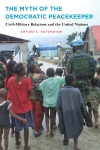guest post by Arturo C. Sotomayor
Since the 1990s, UN peacekeeping has experienced a sea change in the frequency, nature, and purposes of its missions. During the Cold War era, for example, there were never more than five missions operating at any one time, while after the first Gulf War there were twelve. Troop levels have also increased from 78,000 soldiers in 1990 to over 97,000 blue helmets in 2013. Moreover, peacekeepers have been given increased responsibilities in maintaining peace abroad and tasked with highly complex functions. In places like the Democratic Republic of Congo (DRC) and the Central African Republic, the UN Security Council has authorized robust mandates to its peacekeepers, providing them with the authority to use force in offensive campaigns against belligerent forces, relying on drones for surveillance and patrols, and cooperating with heavily armored French and African troops.
Not only has there been a dramatic increase in the demand for peacekeepers, there has also been a radical change in the number and quality of the blue helmets supplied by troop-lending countries. The so-called middle powers (Canada, Sweden, Norway, and Denmark), for example, no longer provide the bulk of the UN’s peacekeeping contingents. Instead, more than half of the top eighteen UN troop contributors are newcomers, and almost two-thirds come from the third or developing world. The majority of these countries have poorly professionalized armies.
Unfortunately, the record number of UN peacekeeping operations in the world has not always been accompanied by increased measures to ensure troop accountability and transparency. As The New York Times recently pointed out, the UN has been charged with gross negligence, corruption, and serious oversight lapses in its own peacekeeping practices. In Haiti, for example, blue helmets have been accused of spreading cholera and committing sexual abuses. In Sudan and the DRC, UN soldiers have been found to be responsible for institutional corruption and bribery.
What is wrong with the UN peacekeeping system? Why are so many UN peacekeepers misbehaving? At the most basic level, there is a serious lapse in the current training system. The proliferation of peacekeeping training programs around the globe and the flexible system in which UN member states can prepare and train their own troops for peacekeeping have not flourished. Military organizations have trained troops according to their own standards, which has led to variations in levels of professionalism and, on occasion, to poor performance in the field. Quality and homogenizing standards are needed. The UN could start by certifying training centers that implement changes and apply good standards (inclusion of civilian instructors, training in humanitarian law, language instruction, etc.) while decertifying those that continue to rely on outdated, perverse peacekeeping doctrines. Reputational costs—prestige or the fear of being decertified—might compel member states to take training more seriously.
Moreover, UN peacekeepers are rarely punished and prosecuted when they misbehave. Currently, the UN is unable to hold peacekeepers legally accountable. The Status of Forces Agreement governing peacekeepers, which were agreed upon by most UN troop-lending states, allows for civil action to proceed only with the mission commander’s approval, which is virtually impossible to secure. Consequently, the UN itself offers few incentives to modify military behavior and norms of conduct. If peacekeeping is to become more credible, it will need to become more accountable for its actions. Just as the UN increases its role in promoting world democracy and civilian oversight, its peacekeepers too have to become more democratic and transparent. The time has thus come to modify the current system and allow the UN to prosecute the “bad apples” in international tribunals.
The views expressed in this blog entry are those of the author and do not reflect the official policy or position of the Naval Postgraduate School, Department of Defense, or the U.S. government.
 Arturo C. Sotomayor is an assistant professor in the National Security Affairs Department at the Naval Postgraduate School in Monterey, California. He is the author of The Myth of the Democratic Peacekeeper: Civil-Military Relations and the United Nations, now available from JHU Press.
Arturo C. Sotomayor is an assistant professor in the National Security Affairs Department at the Naval Postgraduate School in Monterey, California. He is the author of The Myth of the Democratic Peacekeeper: Civil-Military Relations and the United Nations, now available from JHU Press.
